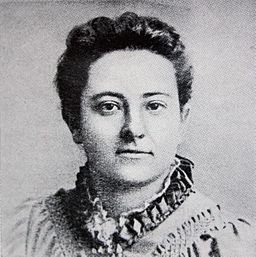Daughter of a German missionary father and British mother, Olive Schreiner (1855-1920) was born on the border of the Cape Colony in South Africa in 1855 where, apart from some time in London in the 1880s and the early twentieth century, she resided until she died in 1920. The cross-national nature of her parents' identities is indicative of her own later embroilment in the politics of nationality, identity, religion and race in Southern Africa, issues with which she grappled ferociously throughout her lifetime.
She thought of herself as South African - as opposed to English, German or even Dutch (the Dutch Boers were a central part of her African experience and they are recurring concern of both her fiction and non-fictional writings) - at a time when tumultuous events, from brutal wars to swift economic industrialization, were contributing to the formation of the nation.
Schreiner lived through the horrors of both Anglo-Boer Wars to see the passing of the South Africa Act by the British Parliament in 1909, which led to the creation of the Union of South Africa. However, though Schreiner was a self-identified South African writer, it is important not to assume that she approved of the institutional principles upon which the Union was founded. Indeed, the opposite is true: throughout her life she interrogated, questioned and protested on the part of the oppressed, and this did not change when South African finally came into being, founded as it was on the disenfranchisement of native Black Africans that - as the main labour force in the recently industrialized gold and diamond mines - were the motor of the new nation's economic development.
However, native Africans scarcely feature in Schreiner's fiction, and her efforts on their part came in the early 1900s when she and her brother William (who had been Prime Minister of the Cape Colony from 1898 to 1900) made several trips to London, accompanied by many Western-educated native Africans, to appeal against the racially discriminate legislation that was written into the formation of the Union of South Africa. By this point in her writing career, Schreiner was writing mostly non-fictional polemic texts -- the last of her fictional work to be published in her life time had appeared in 1897. Furthermore, this final publication, a novella entitled Trooper Peter Halket of Mashonaland, was deeply political in its open critique of the violent and exploitative activities of British capitalists in Southern Africa. From a literary perspective, Trooper Peter combined the allegorical style that had emerged in her earlier collections of short stories, Dreams (1890) and Dream Life and Real Life (1893), with the critical tone of her many pamphlets and polemic texts that followed. In turn, this allegorical technique was first honed in parts of the only full-length novel that Schreiner published during her lifetime: The Story of an African Farm (1883). Her first attempt at a novel, Undine, and the significantly longer From Man to Man, a novel that she worked on and returned to throughout her life, were only published posthumously, and can be read respectively as precursor to and extension of Schreiner's most famous work, as well as texts in their own right.
The Story of an African Farm is the text that most students will first come to when they begin to study Schreiner, and despite the heterogeneity of its concerns and the inconsistencies of its arguments, the novel offers perhaps the fullest way into the complexity of Schreiner's thought. The novel is punctuated throughout by the philosophical influence of eminent Victorian writers such as John Stuart Mill, Herbert Spencer, and Ralph Waldo Emerson, both textually (many of the novel's thematic explorations engage with these writers' ideas on the subjection of women, evolution and the natural world) and literally (the novel's characters are found reading books that, though never spelt out directly, are authored by these important thinkers). But in this novel, as in her life, Schreiner never adhered to any one of these internally coherent philosophies in their entirety. Instead, she compiled her own highly individual belief system from them, rejecting aspects she found problematic, and supplementing them with her own firsthand experience of Southern Africa. She thus produced a constantly fluctuating critical examination of dominant Western discourses of the period.
We often find Schreiner described as socialist, feminist and anti-imperialist -- three broad movements that, at the time at least, were distinctly radical. However, these labels imply a separateness between the agendas they signify, whilst simultaneously attempting to define Schreiner within categories themselves produced in the West. Schreiner's holistic vision of the world propounded by her fiction was transferred into her politics, where she understood these different radical frontiers as interconnected: if women were to realize social equality, for example, Schreiner understood that that society would necessarily have to grant the same equalities to Black Africans. Additionally, it was Schreiner's colonial setting - her experience of landscapes, cultures and peoples that lay outside of the European world - that enabled her to produce critical perspectives and original ideas that were astonishingly ahead of her time.
Further reading: Woman and Labour

